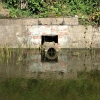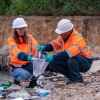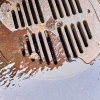
Why We Need a New Approach
Annual (or even quarterly) MS4 refresher courses are mandatory under the NPDES Phase II program, yet completion logs and pop-quiz scores often reveal that municipal crews quickly forget key practices such as spill-response or best management practice (BMP) housekeeping. Environmental Protection Agency (EPA) guidance notes that the absence of ongoing, engaging refreshers is a common weakness in stormwater programs, leading to audit findings and preventable discharges (epa.gov).
Gamification, applying proven game mechanics like points, badges and story-driven challenges, has emerged as a cost-effective fix. Research shows that adding game elements raises learner motivation and markedly improves knowledge retention in compliance settings (lrn.com).
| Game Mechanic | Why It Matters for MS4 Staff | Practical Example |
|---|---|---|
| Points & Badges | Provide instant feedback and trigger dopamine rewards that cement memory. | Award a “Spill-Stopper” badge after a perfect chemical-handling mini-game. |
| Leaderboards | Encourage friendly competition across departments or DPW garages. | Post a monthly IDDE score table on the intranet. |
| Branching Scenarios | Allow learners to test judgment in a safe simulation and see consequences. | Choose-your-path story of responding to an illicit discharge call. |
| Timers & Time-Savers | Simulate field pressure and build procedural fluency. | “Beat the clock” inspection of a virtual culvert before rain starts. |
| Progress Bars & Streaks | Nudge staff to return for micro-lessons and complete the series. | Five-day stormwater micro-challenge with a streak bonus for daily login. |
A 2025 case study of a global industrial firm reported 100 % course completion and 3,700 staff-hours saved after replacing slide decks with a gamified ethics program (eidesign.net) - evidence that the same tactics can pay off for stormwater refresher content.

Map each Minimum Control Measure (MCM) to a mini-game
IDDE → contaminant “whodunit” quiz
Construction runoff → erosion-control sandbox
Good-housekeeping → timed shop-cleanup simulation
Build micro-modules (5-8 minutes) so crews can finish between field tasks.
Blend media: 360° photos from local outfalls, short explainer videos and quick polls.
Leverage low-code tools (Articulate Rise, Kahoot, Quizizz) or full LMS platforms with gamification plugins (e.g., LRN Catalyst, Axonify).
Localize the story - use your town’s watershed map and familiar street names for authenticity.
Ready-made videos and webinars in the INAFSM resource sheet or EPA’s Clean Water Academy can be wrapped into these modules, saving production time (epa.gov).
| Phase | Key Actions | Metrics |
|---|---|---|
| Pilot (Month 1–2) | Convert one high-risk topic (e.g., fuel-station BMPs) into a gamified module; recruit 15 volunteers. | Pre/post quiz delta, satisfaction survey. |
| Iterate (Month 3) | Refine based on feedback; add accessibility features and mobile view. | 90 %+ positive UX rating. |
| Roll-Out (Month 4–6) | Launch the full six-module track; announce leaderboard on pay-stubs and tailgate meetings. | Completion rate, average score, time-to-completion. |
| Sustain (Ongoing) | Quarterly “boss battles” tied to seasonal tasks (e.g., de-icing BMPs in November). | Year-over-year reduction in corrective-action memos. |
Knowledge retention - Repeat a micro-quiz 60 days post-training. Aim for ≤ 10 % score drop.
Behavioral change - Track field audit findings or spill reports. A downward trend indicates applied learning.
Engagement analytics - LMS data on time-on-task and voluntary replays.
Regulatory outcomes - Fewer MS4 audit deficiencies and faster corrective actions logged in your SWMP.
Rotate seasonal themes (e.g., Spring “BMP Quest”).
Offer small perks: coffee-gift cards for top monthly scores.
Let crews design new challenges - peer-generated content keeps it fresh.
Publish a departmental dashboard so management can recognize high performers publicly.
Gamification turns the once-dreaded MS4 refresher into a bite-sized, high-impact experience that municipal crews actually enjoy. With modest investment in authoring tools and a clear implementation plan, DPWs can raise retention, slash training hours and strengthen audit readiness, all while fostering a culture that values clean water.

 Stormwater culverts come in a wide range of materials, and each type carries a unique combination of strength, lifespan, cost, and installation consid…
Stormwater culverts come in a wide range of materials, and each type carries a unique combination of strength, lifespan, cost, and installation consid…
 A well managed stormwater program depends on accurate and complete information about every outfall in a community. Outfalls are the final discharge po…
A well managed stormwater program depends on accurate and complete information about every outfall in a community. Outfalls are the final discharge po…
 When crews encounter contaminated sediments during routine work, or when a concerned homeowner reports a suspicious odor or unusual discharge, the sit…
When crews encounter contaminated sediments during routine work, or when a concerned homeowner reports a suspicious odor or unusual discharge, the sit…
 Opening and entering drainage structures requires a practiced, methodical approach that protects workers from unseen dangers and ensures that every st…
Opening and entering drainage structures requires a practiced, methodical approach that protects workers from unseen dangers and ensures that every st…
 Constructed wetlands are engineered systems that mimic the natural processes of a real wetland in order to treat stormwater, wastewater, or other poll…
Constructed wetlands are engineered systems that mimic the natural processes of a real wetland in order to treat stormwater, wastewater, or other poll…
 A complete and accurate stormwater map is one of the most important responsibilities for any community that operates as a Municipal Separate Storm Sew…
A complete and accurate stormwater map is one of the most important responsibilities for any community that operates as a Municipal Separate Storm Sew…